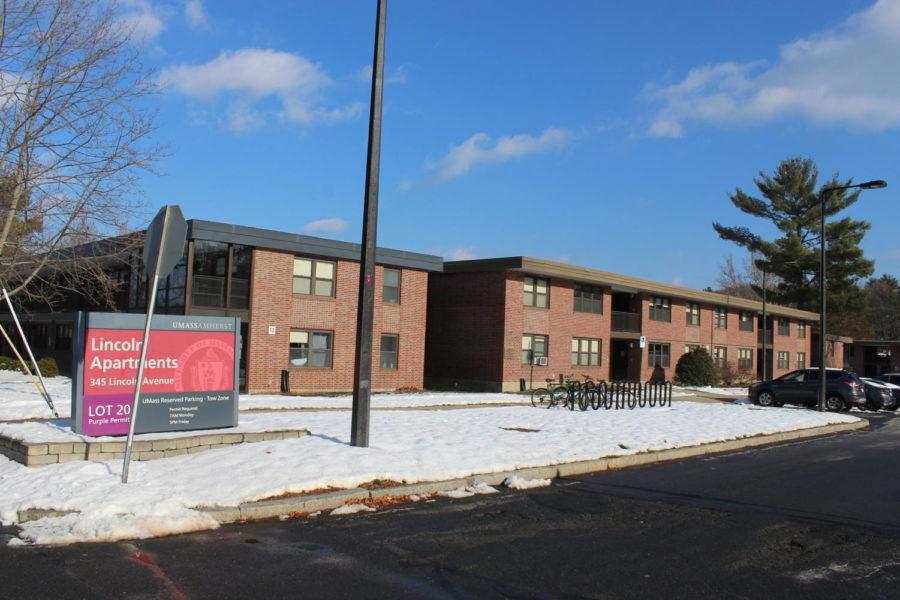The University of Massachusetts is taking steps toward building new undergraduate, graduate and family housing after the displacement of North Village and Lincoln Apartments residents during last summer.
According to a March 18 University news release, UMass is moving forward with plans to develop student housing options with targeted completion dates of fall 2022 for family housing and fall 2023 for student housing. Both will be built on Massachusetts Ave.
In 2019, the University announced both the North Village complex and Lincoln Apartments would be demolished and replaced with new undergraduate and graduate housing due to the age and condition of the complexes. That decision sparked concern from North Village residents, who worried of losing the family housing.
“Planning for the project has continued during the pandemic, but the major disruption of all university operations understandably affected the schedule due to the primary focus on managing critical health and safety priorities for the entire campus,” University spokesperson Ed Blaguszewski said.
According to Blaguszewski, the demolition of both complexes is projected to take place this summer and fall, a year after the buildings were initially closed.
“The University needed time to enter the [North Village] units once vacant starting in fall 2020 to begin the initial work required for demolition,” Blaguszewski said.
The Lincoln Apartments have been used as COVID-19 housing for UMass students exposed to the virus during the spring semester.
Nefeli Forni Zervoudaki, a member of Graduation Employee Organization, was uprooted from her home in North Village in August. Zervoudaki, along with her husband and son, moved from their close-knit community of graduate families to Presidential Apartments. Many families from North Village Apartments were relocated to locations like Presidential, Brandywine, or other off-campus apartments secured by the University in the area.
“We were basically forced out, we were evicted in a time when the pandemic, the surge was immense,” Zervoudaki said. “We had the admin, quite literally, at one of the meetings say, ‘of course it is a weird thing for us to be asked to stay at home, and simultaneously to demand you to evict and to move, but I guess this is how it is,’ which was the most inhumane, inhumane situation.”
Because apartments like Presidential are more expensive than North Village, UMass provided grants of $600 per family unit to cover the difference in cost, according to Antonios Gounalakis, a member of the GEO steering committee. Students living at Lincoln were also provided moving assistance and grants, according to Blaguszewski.
“UMass comes and pays $600 per family unit to cover the difference between what the grad students were paying and what private residential housing costs,” Gounalakis said. “So, right from the bat, we have a movement that is immoral during a pandemic, illegal according to state orders and, financially, it puts UMass in a worse position.”
Blaguszewski said the University gave residents of North Village and Lincoln Apartments “extended notice of the closure starting in the fall 2019 so they could plan ahead for their future housing needs in fall 2020.” The University also worked with area landlords to aid displaced graduate students in finding secure alternative housing. Although the University did aid residents in finding housing, there were additional consequences of uprooting families in the midst of a pandemic.
“These new units that we moved in many ways are not ideal for families,” Zervoudaki said. “We lost friends and communities.”
The student family housing project aims to support a community in the buildings that replace North Village in fall of 2022.
“The student family housing project will support a community through site planning and physical features such as playgrounds and outdoor and indoor shared community spaces,” Blaguszewski said.
The University hopes to provide opportunities for student input through undergraduate and graduate focus groups, such as in the SGA or GSS, who began meeting with the project team this semester, Blaguszewski said.
“A recent housing study shows that the Massachusetts Ave. site… is a favorite among undergraduate students,” Blaguszewski said.
Zervoudaki is still wary of the housing.
“I’m just interested in knowing what these units would be like, how is UMass really prioritizing the graduate students and undergraduate students in the sense that, how are they really listening to their needs, and therefore adapting whatever new buildings they are building to those specific needs,” Zervoudaki said. “What I feel is my experience was that in the summer before, when they had announced the eviction, [UMass was] not really open to listening to what we had to say.”
Leigh Appelstein can be reached at [email protected]. Follow her on Twitter at @LAppelstein.




















